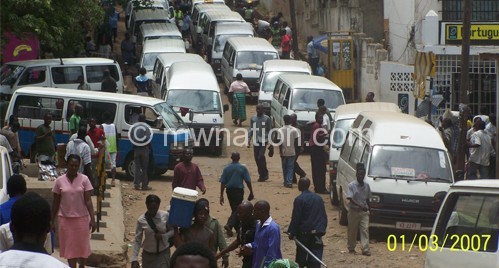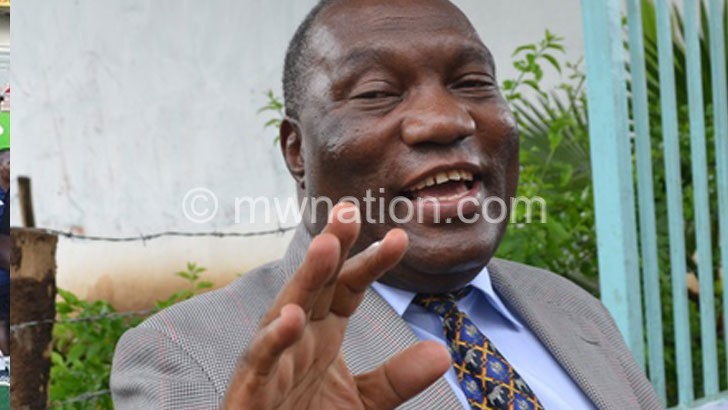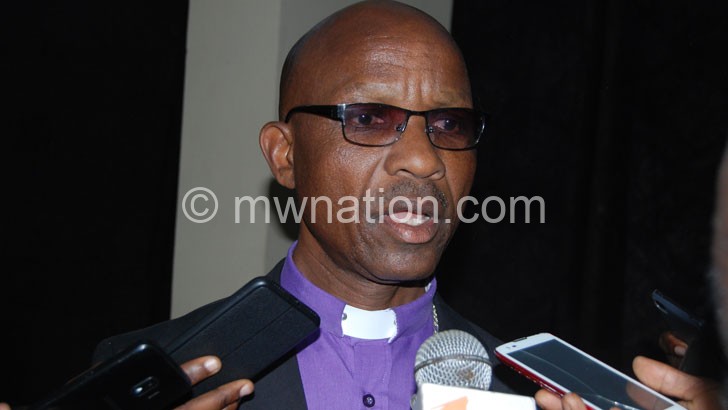How ‘migodi’ extort billions
While city councils struggle to generate revenue for providing services to residents, some self-imposed bus/minibus terminal ‘landlords’, popularly known as ‘eni migodi’ (mine owners), everyday smile all the way to the bank with tax-free millions of kwacha collected illegally from council structures.
From Monday to Wednesday last week Weekend Nation probed how ‘migodi’ operate, who is behind them, how the operators emerge and what contracts, if any, they have with city councils or the government in general.

What we have established is that ‘eni migodi’ are politically connected, largely to the governing party, and exact fees for the use of council structures without paying tax or city charges.
In all the country’s cities—Lilongwe, Blantyre, Zomba and Mzuzu—‘migodi’ ownership comes and goes with every change of government. They collect huge sums of money from bus and minibus operators at the expense of city councils who badly need money to improve service delivery to their residents.
We camped at some minibus and bus terminals in Blantyre, Zomba and Mzuzu where we observed that ‘eni migodi’ or their agents operate side-by-side with city council tax collectors.

At Hardware minibus terminal in Limbe, where Limbe-Mangochi via Zomba minibuses depart from, the ‘mgodi’ owner exacts the equivalent of one passenger fare, which is a minimum of K5 000, from each minibus. On the other hand, Blantyre City Council (BCC), through its tax collectors stationed at the same place, collects a paltry K500 from each departing bus.
In two hours, seven minibuses depart from the terminal, leaving the ‘mgodi’ owner K35 000 richer whereas a meagre K3 500 goes into the city council coffers.
On a normal business day, which starts as early as 4am, as many as 49 minibuses could load for Zomba or Mangochi from this terminal alone. This translates into a tax-free income of about K245 000 per day for the ‘mgodi’ owner while city council tax collectors who work from 7.30am to 5.30pm, would at the most collect K24 000 per day.

Limbe commercial business district (CBD) has nine places where minibuses drop and pick passengers, but the main ones are at Hardware, Limbe Market, Old Limbe Bakery and near the Pound Shop. On the other hand, Blantyre CBD’s main terminals are at Wenela, Mibawa and Blantyre Bus Stands.
In Zomba and Mzuzu, while migodi owners collect an equivalent of a passenger’s fare, the councils collect K150 and K500, respectively.
Our investigations established that in total, ‘migodi’ owners collect an average of K3 million per day from minibus and bus operators in all the country’s four cities—K1 million per day each in Blantyre and Lilongwe; K600 000 in Mzuzu and about K400 000 in Zomba.
This means they collect an average of K90 million per month and K1.08 billion per year, which is about 21.6 percent of BCC’s annual revenue collections from all its business platforms.
Migodi owners are so powerful that even Minibus Owners Association of Malawi (Moam) members pay fees to them.
In an interview last week, Moam general secretary Coaxley Kamange claimed the association’s members countrywide pay over K3 million per day to migodi owners, a development which he said heavily affects their business.
Kamange said money paid to ‘migodi’ owners is not receipted, unlike that paid to council revenue collectors.
“If the money we pay to ‘eni mgodi’ was properly managed, it could help in the development of the country. For example, when our association was receiving money from minibus operators, we developed Mibawa [bus terminal in Blantyre] and bought our own land in Lilongwe,” he said.
Former Limbe ‘mgodi’ owner Isaac Jomo Osman, who is a Democratic Progressive Party (DPP) councillor for Bangwe Mthandizi Ward, said up to the time of the court-sanctioned Fresh Presidential elections in June 2020, he owned the bus and minibus terminals in Limbe which he managed through his agents who shared up to 40 percent of the collection.
He said he assumed ownership of ‘migodi’ after dislodging other contenders in a cat-and-mouse physical fight for each bus/minibus terminal.
According to Osman, he lost his ‘mgodi’ to an alleged Malawi Congress Party (MCP) supporter barely a few days after President Lazarus Chakwera was sworn in.
Osman is also the owner of Ntopwa Football Club, which used to play in the country’s top-flight league until 2020 when it was relegated to the second-tier Thumbs Up Southern Region Football League. The relegation followed an exodus of players from the outfit to other clubs due to financial problems the club started experiencing in 2020.
Zomba and Mzuzu city council officials, too, acknowledged the presence of the illegal revenue collectors in their jurisdictions. Both councils also receive a lot of complaints regarding ‘migodi’ owners harassing passengers but, apparently, the councils have not removed the ‘migodi’ owners for fear of political repercussions.
“It’s very political,” said Zomba City Council director of finance James Mafunga when asked why councils fail to deal with the ‘migodi’ issue.
Mafunga added: “These guys are so powerful that they even impound vehicles if drivers don’t pay them, and they collect more money than the council.”
He said Zomba City Council collects between K100 000 and K150 000 per day from bus and minibus operators which is less than half of what ‘migodi’ owners collect per day.
Mzuzu City Council spokesperson McDonald Gondwe said ‘migodi’ owners play hide-and-seek, which makes it difficult for the council and police to catch them.
He said, on average, the council collects K150 000 and K160 000 per day from bus and minibus operators, “which is just a quarter of what ‘migodi’ owners collect”.
But BCC director of commerce and trade Dennis Chinseu claimed that he was not aware that ‘migodi’ owners still exist in the commercial capital.
“What I know is that it is only BCC tax collectors who collect money [parking fees] from bus, minibus terminals and markets,” he said.
BCC has an annual revenue target of K9 billion from all its revenue collection platforms, which include city rates, various types of licences and parking fees, but only collects K400 million per month or K4.8 billion annually, according to a source privy to BCC financial operations. At K30 million per month or K360 million annually, ‘migodi’ owners in Blantyre and Limbe CBDs collect an equivalent of about 7.5 percent of BCC’s total annual revenue.
Two former Lilongwe and Blantyre city council chief executive officers, who spoke on condition of anonymity, confirmed that ‘migodi’ owners are politically-connected to ruling parties.
According to them, councils’ top officials are powerless and unable to take action against ‘migodi’ operations because they fear for their jobs.
The new owner of the bustling Limbe ‘mgodi’, a Mhango, initially agreed to meet Weekend Nation for an interview last Thursday but at the appointed time, he did not pick up our calls until press time.
MCP spokesperson the Reverend Maurice Munthali claimed that his party is not aware of the ‘migodi’ operators, saying there is no law in the country that accommodates such entities. He said if it is really true that MCP members are involved in the operation of ‘migodi’, they should stop immediately.
He said: “Our President [Lazarus Chakwera] has emphatically said that anything that is unlawful must be curbed. As Malawi Congress Party, we want to disassociate ourselves from anything surrounding that arrangement.”
Asked why the Democratic Progressive Party allowed ‘migodi’ to operate during its regn, the party’s spokesman Shadric Namalomba asked for more time to consult. On his part, deputy national police spokesman Harry Namwaza said they are ready to work with the city counciuls if engaged.
In an interview, Minister of Local Government Blessings Chinsinga said his ministry is aware of ‘migodi’ in local councils, but expressed shock that some individual ‘migodi’ owners make such huge sums of money at the expense of councils which struggle to generate revenue.
Asked what the ministry is doing to ensure that councils operate without political interference, Chinsinga, who was appointed minister at the end of January 2022, said government will create systems to ensure that law and order prevail in the city councils.
He said: “It is going to be a slow and gradual process, but a process that will lead to what I would call a reset button that will give rise to systems that are progressive and designed to serve the greater common good.”
Commenting on the matter, social and governance commentator Humphrey Mvula said it is disheartening that ‘migodi’ owners are collecting such huge sums of money at the expense of councils which are struggling to deliver good services due to shortage funding.
Said Mvula: “It is a very serious development for a city council which is struggling to raise money, give basic services and they accept giving away the source of revenue to individuals such as these. If such money was collected by councils, our cities would be clean.”





